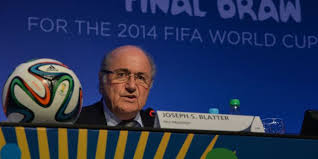By Andrew Warshaw
December 6 – FIFA president Sepp Blatter has appealed to Qatar’s critics to “calm down” over questioning its suitability to stage the 2022 World Cup but insists his organisation will not shirk from its responsibilities to monitor the issue of workers’ rights in the Gulf state which has caused such widespread alarm.
Blatter calls for ‘calm’ while the Qatar issues are worked through

